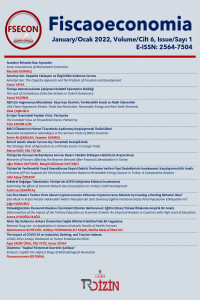Türkiye’de Finansal Serbestleşme Sonrası Rezerv Talebini Etkileyen Faktörlerin Araştırılması
Research of Factors Affecting the Reserve Demand after Financial Liberalization in Turkey
Author(s): Uğur Bülent Kaytanci, Bengül Gülümser KaytanciSubject(s): Economy, Economic history, Methodology and research technology, Economic development, Financial Markets
Published by: Ahmet Arif Eren
Keywords: International Reserves; Capital Flows; ARDL-Bounds Test;
Summary/Abstract: Although the currency system of most countries became more flexible with the collapse of the Bretton Woods system, the forecast for the fall of foreign currency assets of central banks has not been realized; on the contrary, foreign currency assets of central banks have increased significantly in the recent past. The dramatic increase in foreign exchange reserves in the world has encouraged researchers to examine the determinants of foreign exchange reserves and which economic factors are effective in increasing foreign exchange reserves. In this study, the factors affecting the reserve demand of the Central Bank of the Republic of Turkey (CBRT) after financial liberalization were investigated for the period 1990Q1-2018Q4 by using the ARDL bounds testing approach. According to the findings, capital flows, short term debts, S&P's Turkey rating, and GDP per capita affected foreign exchange reserves in terms of both long-term and short-term relations in the period examined. This effect, in terms of capital flows, both in terms of long and short-term relations, is in a positive direction and at the highest level compared to other factors. We can state that the effect of short-term debts and GDP per capita on reserves has been positive in the long term and negative in the short term, and for the S&P's Turkey rating, this effect is negative in the long term and positive in the short term.
Journal: Fiscaoeconomia
- Issue Year: 6/2022
- Issue No: 1
- Page Range: 142-160
- Page Count: 19
- Language: Turkish

